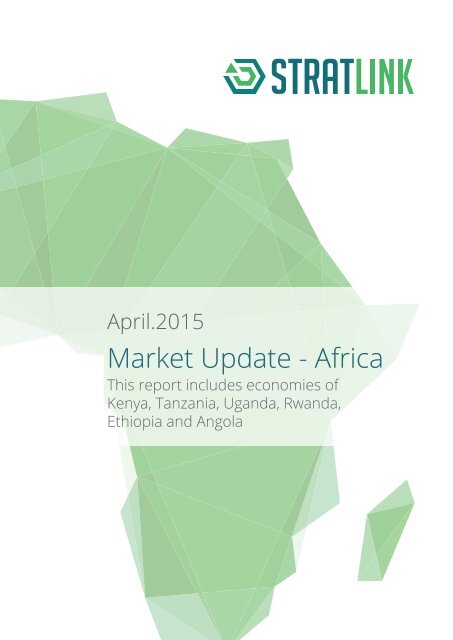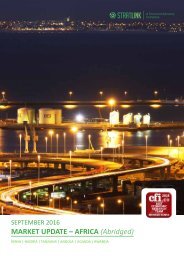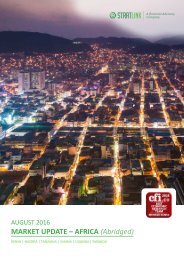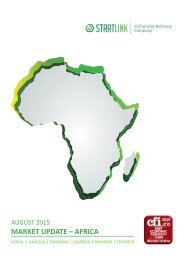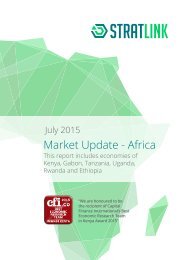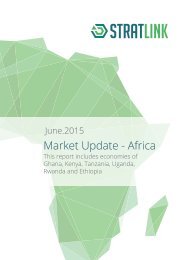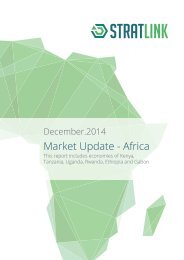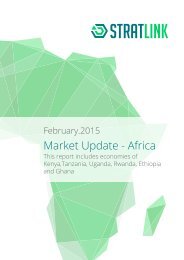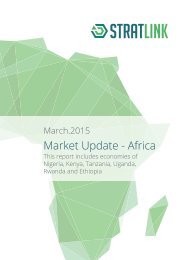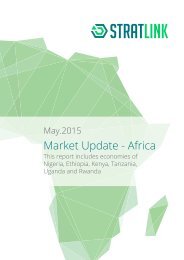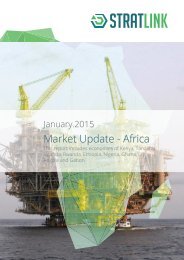Africa Market Update - April 2015
Includes economies of Kenya, Uganda, Tanzania, Rwanda, Ethiopia and Angola
Includes economies of Kenya, Uganda, Tanzania, Rwanda, Ethiopia and Angola
Create successful ePaper yourself
Turn your PDF publications into a flip-book with our unique Google optimized e-Paper software.
<strong>April</strong>.<strong>2015</strong><br />
<strong>Market</strong> <strong>Update</strong> - <strong>Africa</strong><br />
This report includes economies of<br />
Kenya, Tanzania, Uganda, Rwanda,<br />
Ethiopia and Angola
MARKET UPDATE – AFRICA | March <strong>2015</strong><br />
01. Kenya<br />
2 | StratLink <strong>Africa</strong> Ltd.<br />
www.stratlinkglobal.com
MARKET UPDATE – AFRICA | March <strong>2015</strong><br />
POLITICAL OUTLOOK<br />
Wanton Corruption: Blight on<br />
Kenya’s Profile<br />
Kenya’s institutional and governance reform<br />
profile is confronting headwinds after<br />
it emerged, from the country’s top anti-graft<br />
watchdog, that a number of state officers<br />
have been involved in misappropriation of<br />
public funds. Further, suspension of the<br />
Parliamentary Public Accounts Committee’s<br />
sittings over alleged corrupt dealings by<br />
members with a view to influencing the outcome<br />
of a matter under investigation comes<br />
as a blow to Kenya’s war on corruption. Allegations<br />
of corruption are also reported to<br />
have marred parliament’s Agricultural Committee’s<br />
investigation of the state of sugar<br />
manufacturing company, Mumias. Whereas<br />
the President has taken bold steps to purge<br />
the government of corruption in the recent<br />
past, only decisive action going forward will<br />
help tame pilferage of resources from state<br />
coffers.<br />
Corruption: Undermining Optimal<br />
Resource Allocation<br />
In the last decade, Kenya has been on an aggressive<br />
reform agenda that has played a<br />
critical role in improving investor perception<br />
of the economy. If left unaddressed, allegations<br />
of corruption against top watchdog<br />
bodies and state officers are bound to<br />
pour cold water on these efforts. Kenya is<br />
estimated to lose up to USD 750.0 Million 1<br />
(1.4% of GDP 2 and twice the construction<br />
cost of the 50.0km Nairobi-Thika Superhighway)<br />
to corruption annually.<br />
Tanzania Experience: Development<br />
Partners Backlash<br />
In the last two quarters of 2014, alleged involvement<br />
of state officials in a corrupt deal<br />
to the tune of USD 124.0 million saw development<br />
partners withhold donor funding<br />
from Tanzania. This impacted the country’s<br />
risk profile negatively as it occasioned challenges<br />
in financing budget needs. Official<br />
Development Assistance as a ratio of Kenya’s<br />
annual budget stands at about 22.0%,<br />
having risen from 17.0% in 2009/10 3 and<br />
1 Institute of Certified Public Accountants 2014<br />
2 Gross Domestic Product<br />
3 National Treasury Data, Official Development Statistics<br />
Data<br />
could pose similar risks if development<br />
partners take similar action as they did in<br />
Tanzania.<br />
University Attack Dwarfs September<br />
2013 Westgate Siege<br />
Despite a period of relative calm, the <strong>April</strong><br />
02nd, <strong>2015</strong> Al Shabaab attack on a university<br />
in Garissa which is reported to have<br />
claimed 148 lives points at unmitigated fragility<br />
of the country’s security risk profile.<br />
Coming on the back of a shake-up in the top<br />
brass of the country’s security apparatus,<br />
the attack exposes institutional gaps in the<br />
anti-terror strategy which has been on the<br />
spot following recurrent incidences in 2014.<br />
The attack came barely a week after the<br />
British High Commission had issued a travel<br />
advisory highlighting risk in particular parts<br />
of the country, further raising questions<br />
BUSINESS ENVIRONMENT<br />
Standard Chartered Bank Touts Kenya<br />
Kenya is estimated<br />
to lose up to USD<br />
750.0 Million<br />
(1.4% of GDP<br />
and twice the<br />
construction cost<br />
of the 50.0km<br />
Nairobi-Thika<br />
Superhighway)<br />
to corruption<br />
annually.<br />
Multinational, Standard Chartered Plc, has touted Kenya and<br />
Nigeria as the two countries in <strong>Africa</strong> presenting the best opportunities<br />
for business expansion in <strong>2015</strong>. Coming barely one<br />
month since Kenya was ranked by Fortune Magazine amongst<br />
the seven economies best poised to succeed the BRICS as a<br />
growth frontier, it is likely to elevate further investor perception<br />
of the country.<br />
Nigeria’s Uncertainty Bodes Well for Kenya<br />
Uncertainty over Nigeria’s investment climate in the shortterm<br />
in view of the March <strong>2015</strong> election cycle and depressed<br />
oil prices is bound to prop Kenya further in investor consideration.<br />
Further, unlike Nigeria, Kenya has a much larger<br />
Middle-Class Population as<br />
% of Total Population<br />
Source: <strong>Africa</strong> Development Bank, StratLink <strong>Africa</strong><br />
middle-class population 4<br />
(a popular target market<br />
for investors eyeing<br />
frontier markets) as a<br />
proportion of the entire<br />
population.<br />
This suggests Kenya has<br />
higher potential for<br />
consumer demand<br />
compared to Nigeria in<br />
the medium to longterm<br />
thereby pitching it<br />
in more favourable sight.<br />
4 The population that consumed between USD 2.0 and USD 20.0 per month<br />
www.stratlinkglobal.com<br />
StratLink <strong>Africa</strong> Ltd.| 3
MARKET UPDATE – AFRICA | March <strong>2015</strong><br />
We retain our<br />
February <strong>2015</strong><br />
view that the<br />
shilling is bound<br />
to remain weak<br />
exchanging within<br />
the 90.0 – 93.0<br />
units to the<br />
greenback in the<br />
near term.<br />
over Kenya’s state of preparedness and intelligence<br />
response. USA President, Barrack<br />
Obama, has however reiterated that he will<br />
visit the country in July <strong>2015</strong> in a move that<br />
is widely perceived as a much needed vote<br />
of confidence in the country’s anti-terror efforts.<br />
ECONOMIC OUTLOOK<br />
Shilling Trends on Lows Last Seen in 2011<br />
Despite indications that the USD 688.0 Million<br />
Precautionary Loan from the International<br />
Monetary Fund (IMF) could be helping<br />
in propping foreign exchange reserves,<br />
the shilling slid to cross the 92.0 units of<br />
exchange to the greenback mark on March<br />
16th, <strong>2015</strong>. The local unit has been under<br />
immense pressure and is now trending on<br />
lows last seen in 2011 when steady depreciation<br />
was brought about by commercial<br />
bank speculation.<br />
We retain our February <strong>2015</strong> view that the<br />
shilling is bound to remain weak exchanging<br />
within the 90.0 – 93.0 units to the greenback<br />
in the near term.<br />
Foreign Exchange Reserves vs<br />
Import Cover<br />
Noting that 2014 was a particularly challenging<br />
year for the economy with the main<br />
export commodities such as tea (21.0% of<br />
export earnings) weathering subdued prices<br />
and tourism beset by terror risks, investors<br />
should anticipate the shilling to remain<br />
weak in the near term.<br />
Shilling vs USD Exchange Rate<br />
Source: Bloomberg, StratLink <strong>Africa</strong><br />
We project the country’s balance of trade<br />
deficit to have widened by about 7.9% yearon-year<br />
to USD 8.2 Billion by close of 2014.<br />
In <strong>2015</strong>, however, the trade balance deficit<br />
is likely to decline as the country is cushioned<br />
of a high oil import bill following the<br />
decline in global oil prices. Manufacturers<br />
are also poised to reap from the declining<br />
cost of production and boost export competitiveness<br />
in the regional market.<br />
Trade Balance Deficit<br />
Source: Central Bank of Kenya, StratLink <strong>Africa</strong><br />
Domestic and External Factors to<br />
Depress Local Unit<br />
We expect the shilling to remain fragile driven<br />
principally by two factors: One, the state<br />
of the current account and notably a hangover<br />
of deterioration of the balance of payments<br />
following a challenging year in 2014.<br />
Source: World Bank, StratLink <strong>Africa</strong><br />
4 | StratLink <strong>Africa</strong> Ltd.<br />
www.stratlinkglobal.com
MARKET UPDATE – AFRICA | March <strong>2015</strong><br />
USA Dollar Rally to Undermine the<br />
Shilling<br />
The second factor that is likely to undermine<br />
the value of the shilling is the strong<br />
rally by the greenback. The rally by the dollar<br />
has been driven by rising demand for the<br />
unit (USD) with 2014 largely characterized<br />
by indications of recovery from the recession.<br />
Consumer spending in Q4, 2014 rose<br />
by 4.2%, 100.0 bps higher than the same period<br />
in 2013 5 .<br />
Federal Funds Rate: Imminent Raise?<br />
The Federal Reserve is widely anticipated<br />
to raise interest rates towards the end of<br />
Q2, <strong>2015</strong> (June/July). With the USA market<br />
potentially becoming more lucrative for<br />
savers and investors eyeing government<br />
borrowing, we assess that high demand for<br />
the greenback is likely to continue thereby<br />
undermining the strength of the shilling.<br />
DEBT MARKET UPDATE<br />
Rising liquidity in the money market has<br />
seen fixed income yields trend downwards<br />
in the period between February and March<br />
<strong>2015</strong>. Dealers report that maturities stood<br />
at about USD 564.9 Million in March <strong>2015</strong>,<br />
a marked 73.3% higher than estimates of<br />
the January – February <strong>2015</strong> average with<br />
minimal reports of a mop up exercise by the<br />
Central Bank.<br />
Bloomberg BVAL Yields Index<br />
Nigeria Uncertainty Promises<br />
Dividend<br />
Peripherally, an adverse investment climate<br />
in Nigeria has also contributed to the downtrend<br />
in yields as foreign investors scout for<br />
a safer destination in view of the country’s<br />
election cycle and fiscal deterioration.<br />
We, however, do not expect the downtrend<br />
in yields to prolong owing to the uptick in<br />
inflation bound to be further aggravated<br />
by a protracted dry spell. Further, government<br />
borrowing is likely to remain elevated<br />
through the remaining period of financial<br />
year 2014/15.<br />
Infrastructure Bond March <strong>2015</strong><br />
Description<br />
Amount<br />
Offered (USD Mln) 272.5<br />
Received (USD Mln) 563.1<br />
Performance Rate 206.6%<br />
Yield to Maturity 11.7%<br />
Coupon Rate 11.0%<br />
Source: Central Bank of Kenya, StratLink <strong>Africa</strong><br />
Inflation in March <strong>2015</strong> stood at 6.3%, 70.0<br />
bps higher than the February <strong>2015</strong> rate.<br />
The Energy Regulatory Commission revised<br />
upwards petroleum product prices for the<br />
period March 14th, 2014 to <strong>April</strong> 15th, <strong>2015</strong>,<br />
a move that could further inflict an uptrend<br />
on inflation.<br />
Inflation Trend<br />
With the USA<br />
market potentially<br />
becoming more<br />
lucrative for<br />
savers and<br />
investors eyeing<br />
government<br />
borrowing, we<br />
assess that high<br />
demand for<br />
the greenback<br />
is likely to<br />
continue thereby<br />
undermining the<br />
strength of the<br />
shilling.<br />
Source: Bloomberg, StratLink <strong>Africa</strong><br />
5 Bureau of Economic Analysis, USA Department of<br />
Commerce<br />
Source: Central Bank of Kenya, StratLink <strong>Africa</strong><br />
Central Bank is not reported to have intervened<br />
in the market through mopping of<br />
liquidity in the money market. We believe<br />
this is the principal reason that has seen<br />
the interbank rate trend as low as 5.8% in<br />
March <strong>2015</strong>.<br />
www.stratlinkglobal.com<br />
StratLink <strong>Africa</strong> Ltd.| 5
MARKET UPDATE – AFRICA | March <strong>2015</strong><br />
Interbank Rate<br />
Source: Central Bank of Kenya, StratLink <strong>Africa</strong><br />
EQUITY MARKET UPDATE<br />
One: Companies Post Depressed<br />
Performance in 2014<br />
Media service provider, Nation, reported a<br />
2.9% decline in net profits for the full year<br />
ended 2014 to USD 26.8 Million with revenues<br />
remaining near flat at USD 145.4 Million.<br />
Similarly, top tier bank, Co-operative,<br />
saw its net profit drop by 7.0% to USD 91.0<br />
Million on the back of major restructuring in<br />
2014. CIC Insurance also reported a decline<br />
in net profit, by 16.6% in 2014, to USD 11.9<br />
Million. The decline in profit was occasioned<br />
by a 42.6% surge in total expenses to USD<br />
143.2 Million.<br />
Co-operative Bank vs Nation Media<br />
Share Price (Kes)<br />
+6.1 %<br />
NSE 20 Share Index<br />
change year-on-year<br />
NSE 20 Share Index Trend<br />
-3.5 %<br />
NSE 20 Share Index<br />
change month-onmonth<br />
Source: Bloomberg, StratLink <strong>Africa</strong><br />
NSE 20 Share Index Month-on-Month<br />
Source: Bloomberg, StratLink <strong>Africa</strong><br />
Source: Bloomberg, StratLink <strong>Africa</strong><br />
Such performance has played a major role<br />
in subduing aggregate market performance<br />
in March <strong>2015</strong>. The performance points to<br />
an adverse business climate confronted by<br />
corporates in 2014. Notable strain on the<br />
business climate in 2014 stemmed from<br />
high terror risk that affected players in the<br />
service sector.<br />
Two: Capital Gains Tax Hangover<br />
The market has also been decelerated by<br />
uncertainty over the fate of the Capital<br />
Gains Tax that is likely to have left many<br />
investors adopting a wait and see stance.<br />
In February <strong>2015</strong>, brokers threatened to<br />
suspend trading for a month over disagreement<br />
with the Kenya Revenue Authority on<br />
their role as collecting agents.<br />
6 | StratLink <strong>Africa</strong> Ltd.<br />
It has been a bearish season at the exchange<br />
in what we assess can be attributed<br />
to two main factors:<br />
www.stratlinkglobal.com
MARKET UPDATE – AFRICA | March <strong>2015</strong><br />
Financial Services to Prop <strong>Market</strong><br />
Be that as it may, we expect the market to<br />
regain its bullish trend driven, notably, by<br />
sentiment around companies listed in the<br />
financial services segment majority of which<br />
reported bullish results for the year ended<br />
December 2014. Equity Bank Ltd posted a<br />
33.2% surge in net profit year-on-year to<br />
December 2014 to USD 183.5 Million. The<br />
bank’s Non-interest income accelerated by<br />
24.6% compared to 10.4% growth in Net Interest<br />
income, boding well for the bank in<br />
view of efforts to rein on high interest rates.<br />
Equity Bank Share Performance<br />
Source: Bloomberg, StratLink <strong>Africa</strong><br />
Kenya Commercial Bank Trails<br />
Equity Bank in Net Profit Growth<br />
Top tier lender, Kenya Commercial Bank,<br />
saw its net profit for the year ended December<br />
2014 grow by 27.8% to USD 172.8 Million.<br />
Non-interest Income grew by 17.6% to<br />
USD 516.4 Million compared to 7.5% growth<br />
in interest income. Investors’ anticipation of<br />
the bank’s future is likely to hinge on strategic<br />
partnerships targeting the Small and<br />
Medium Enterprise market.<br />
www.stratlinkglobal.com<br />
StratLink <strong>Africa</strong> Ltd.| 7
MARKET UPDATE – AFRICA | March <strong>2015</strong><br />
02. Tanzania<br />
8 | StratLink <strong>Africa</strong> Ltd.<br />
www.stratlinkglobal.com
MARKET UPDATE – AFRICA | March <strong>2015</strong><br />
POLITICAL OUTLOOK<br />
Tempestuous Ride for Tanzania<br />
Preparations for the much awaited referendum<br />
hit a snag after the government suspended<br />
issuance of national identity cards<br />
citing shortage of funds and human capital.<br />
Noting that this came in quick succession to<br />
the suspension of biometric voter registration<br />
in parts of the country, the country’s<br />
political risk profile is likely to be impacted<br />
negatively as questions abound over the<br />
state of preparedness for carrying out free<br />
and fair referendum and election in <strong>2015</strong>.<br />
Widening Rift as the Hour Draws Nigh<br />
The rift continues to widen over contentious<br />
issues pertaining the <strong>April</strong> <strong>2015</strong> referendum<br />
with the main opposition party (CHADEMA)<br />
calling for a boycott of the exercise. The opposition<br />
umbrella body (Ukawa Group) pulled<br />
out of the constitution review process following<br />
the unresolved question of having the document<br />
provide for a two or three tier government<br />
structure for the country going forward.<br />
The country is bound to remain in heightened<br />
political temperatures ahead of the referendum<br />
and the October <strong>2015</strong> election. Investors<br />
will be keenly following the passage or rejection<br />
of the new constitution and the aftermath<br />
given the impasse between the government<br />
and the Ukawa Group.<br />
Improved Donor Aid Props Outlook<br />
Donors, including World Bank and <strong>Africa</strong><br />
Development Bank, have released 8.8%<br />
(USD 44.0 Mln) of the withheld donor support<br />
for the financial year 2014/15 following<br />
graft allegations involving top government<br />
officials. The move is likely to signal confidence<br />
in the remedial measures taken by<br />
the government and thereby elevate Tanzania’s<br />
short-term risk. Improvement in the<br />
country’s fiscal position, especially ahead of<br />
an election, could serve to mitigate growing<br />
risk.<br />
ECONOMIC OUTLOOK<br />
Majority of Sectors Report Strong<br />
Private Sector Credit Growth<br />
Credit to the transport and communication,<br />
trade, manufacturing, construction and hospitality<br />
sectors surged by double digits yearon-year<br />
to January <strong>2015</strong> pointing at high investment<br />
focus on the respective areas. The<br />
sectors are also likely to be benefiting from<br />
declining investor interest in agriculture<br />
(based on trends in credit flow to the sector).<br />
We expect below target growth by the agriculture<br />
sector to continue occasioning a shift<br />
in investment focus towards the service and<br />
construction sectors.<br />
The country is<br />
bound to remain<br />
in heightened<br />
political<br />
temperatures<br />
ahead of the<br />
referendum and<br />
the October <strong>2015</strong><br />
election.<br />
BUSINESS ENVIRONMENT<br />
Employment Regulation<br />
Raffles Feathers<br />
On March 19th, <strong>2015</strong>, parliament<br />
passed a new law effectively setting<br />
restrictions on employment of<br />
foreigners. The new law prescribes<br />
that companies hiring foreigners<br />
must satisfy authorities that the<br />
skills sought are not locally available.<br />
Whereas the new legislation<br />
is aimed at widening accessibility<br />
of employment opportunities to<br />
locals, it hazards posing a negative<br />
net effect to the economy.<br />
Integration: Further Within<br />
or Without?<br />
The new legislation is bound<br />
to fan further perception that<br />
Tanzania is on the periphery of<br />
regional integration efforts as it<br />
could decelerate the realization<br />
of free movement of persons as<br />
envisioned by the East <strong>Africa</strong>n<br />
Community Common <strong>Market</strong><br />
Protocol. In 2014, concern was rife<br />
that Tanzania was being left out of<br />
vital integration efforts as Kenya,<br />
Uganda and Rwanda signed a Defence<br />
Pact and Single Tourist Visa<br />
Pact in January 2014. In February<br />
<strong>2015</strong>, Uganda did away with work<br />
permit fees for Rwandese and<br />
Kenyan nationals.<br />
Adult (15 Yrs +) Literacy Levels<br />
Source: World Bank, UNICEF, StratLink <strong>Africa</strong><br />
www.stratlinkglobal.com<br />
StratLink <strong>Africa</strong> Ltd.| 9
MARKET UPDATE – AFRICA | March <strong>2015</strong><br />
BUSINESS ENVIRONMENT<br />
The passage of the law is likely to<br />
deteriorate the good will of citizens<br />
across the region in accelerating<br />
regional integration since it<br />
is widely perceived as exclusionist.<br />
Further to that, the law is bound<br />
to adversely impact Tanzania’s human<br />
capital base as indicated by<br />
the literacy levels comparison.<br />
From a skillset perspective, Tanzania<br />
also presents a comparatively<br />
high risk in access to labour force<br />
with tertiary education skillsets in<br />
view of Business Monitor International’s<br />
Operational Risk Index<br />
(With 0% representing the highest<br />
risk while 100% represents the<br />
lowest risk). As such, investors in<br />
Tanzania are bound to face challenges<br />
in accessing high skilled<br />
and technical labourers.<br />
BMI Tertiary Education Risk<br />
Index<br />
Source: BMI, StratLink <strong>Africa</strong><br />
Tanzania’s risk profile is likely to<br />
deteriorate in view of the new legislation<br />
which could effectively impede<br />
access to high skilled labour.<br />
Assessment of the enrolment rate<br />
to tertiary institutions indicate that<br />
Tanzania is trailing Kenya.<br />
Enrolment to Tertiary<br />
Institutions<br />
Source: BMI, StratLink <strong>Africa</strong><br />
Year-on-Year Growth in Private<br />
Sector Credit to Agriculture<br />
services and make Tanzania competitive<br />
against its regional peers.<br />
Financial Services Penetration (15Yrs+)<br />
Source: Bank of Tanzania, StratLink <strong>Africa</strong><br />
The telephony segment of the economy has<br />
been vibrant with growing penetration and<br />
is poised to play an increasingly vital role<br />
in driving growth in the coming years. We<br />
expect growth to be strongly underpinned<br />
by investment in infrastructure (fuelling<br />
growth in the transport and construction<br />
sectors) and mobile telephony driven e-<br />
commerce solutions.<br />
Telephony penetration has increased from<br />
15.0% in 2005 to 67.0% in 2013 and should<br />
be central in increasing access to financial<br />
Source: World Bank, StratLink <strong>Africa</strong><br />
Agriculture Portends Risks to Growth<br />
Credit to the agriculture sector contracted,<br />
year-on-year, reflecting a general bearish<br />
outlook by investors. The country’s top<br />
two agricultural exports tobacco and coffee<br />
(5.9% and 3.4% of export earnings) confronted<br />
an adverse climate driven by growing<br />
health consciousness that is denting<br />
10 | StratLink <strong>Africa</strong> Ltd.<br />
www.stratlinkglobal.com
MARKET UPDATE – AFRICA | March <strong>2015</strong><br />
returns from tobacco and depressed prices<br />
that affected coffee.<br />
Agriculture Credit Growth Year-on-Year<br />
T-Bill Yields<br />
+37.3 %<br />
All Share Index<br />
year-on-year change<br />
Source: Bank of Tanzania, StratLink <strong>Africa</strong><br />
With agriculture as the mainstay of the<br />
economy, depressed performance is bound<br />
to undermine growth momentum in the<br />
years ahead.<br />
Agriculture in the Tanzanian<br />
Economy<br />
Consideration<br />
Agriculture Size<br />
Size of GDP 24.7%<br />
Source: Bank of Tanzania, StratLink <strong>Africa</strong><br />
The 91 Day paper yield declined by 370.0<br />
bps to 7.6% while the 182 Day paper yield<br />
declined by 420.0 bps to 9.2%. The 364 Day<br />
paper, on the other hand, saw its yield decline<br />
by 310.0 bps to close the month at<br />
10.3%.<br />
Average Bid-to-Cover Ratios<br />
-3.2 %<br />
All Share Index<br />
month-on-month<br />
change<br />
Traditional Export<br />
Earnings<br />
20.0%<br />
National Food Demand 90.0%<br />
Employment of Labour<br />
Force<br />
75.0%<br />
Coupon Rate 11.0%<br />
Source: Tanzania Government, StratLink <strong>Africa</strong><br />
DEBT MARKET UPDATE<br />
In line with our forecast, inflation nudged<br />
upwards by a marginal 20.0 bps to 4.2% in<br />
February <strong>2015</strong> on the back of rising food<br />
costs. This notwithstanding, yields reported<br />
a considerable decline in March <strong>2015</strong> in<br />
what we assess is likely to have been driven<br />
by trends in government borrowing. We<br />
note that this decline comes on the back<br />
of development partners disbursing USD<br />
44.0 Billion of with-held donor funding that<br />
should have eased the strain on the country’s<br />
fiscal position. As such, the government<br />
is likely to have been under less pressure to<br />
borrow from the domestic market.<br />
Source: Bank of Tanzania, StratLink <strong>Africa</strong><br />
Uptake of short term instruments has been<br />
constrained by tightening liquidity in the<br />
money market. The interbank rate closed<br />
March <strong>2015</strong> at 7.7%, 460.0 bps higher than<br />
it did February <strong>2015</strong>. Liquidity is likely to be<br />
tightening driven by government intervention<br />
with foreign exchange dealers having<br />
reported strong dollar demand in March<br />
from importers. As such, the shilling has<br />
been weakened against major currencies,<br />
likely necessitating intervention by Bank of<br />
Tanzania.<br />
www.stratlinkglobal.com<br />
StratLink <strong>Africa</strong> Ltd.| 11
MARKET UPDATE – AFRICA | March <strong>2015</strong><br />
Liquidity is<br />
likely to be<br />
tightening driven<br />
by government<br />
intervention with<br />
foreign exchange<br />
dealers having<br />
reported strong<br />
dollar demand<br />
in March from<br />
importers.<br />
As such, the<br />
shilling has been<br />
weakened against<br />
major currencies,<br />
likely necessitating<br />
intervention by<br />
Bank of Tanzania.<br />
Interbank Rate and Volumes<br />
Source: Bank of Tanzania, StratLink <strong>Africa</strong><br />
The local unit shed 12.2% year-on-year and<br />
1.6% month-on-month to close March <strong>2015</strong><br />
at 1,842.0 units against the greenback.<br />
Tanzania Shilling vs USD Exchange<br />
Dar es Salaam All Share Index<br />
Month-on-month<br />
Source: Bloomberg, StratLink <strong>Africa</strong><br />
The market has been bearish for the better<br />
part of March <strong>2015</strong> driven by a lull in corporate<br />
action before taking an upswing towards<br />
the end of the month. The uptrend<br />
came on the back of bullish results by Twiga<br />
Cement whose net profit grew by 50.0%<br />
year-on-year to December 2014 to USD 30.2<br />
Million.<br />
Twiga Cement<br />
Source: Bloomberg, StratLink <strong>Africa</strong><br />
EQUITY MARKET UPDATE<br />
Dar es Salaam All Share Index<br />
Source: Bloomberg, StratLink <strong>Africa</strong><br />
In the near term, we expect the market to<br />
exhibit sensitivity to the country’s political<br />
temperatures in the run-up to the <strong>April</strong><br />
30th, <strong>2015</strong> referendum. The country remains<br />
stalemated as to the structure of administration<br />
going forward with the opposition<br />
threatening to boycott the exercise.<br />
Source: Bloomberg, StratLink <strong>Africa</strong><br />
12 | StratLink <strong>Africa</strong> Ltd.<br />
www.stratlinkglobal.com
MARKET UPDATE – AFRICA | March <strong>2015</strong><br />
03. Uganda<br />
www.stratlinkglobal.com<br />
StratLink <strong>Africa</strong> Ltd.| 13
MARKET UPDATE – AFRICA | March <strong>2015</strong><br />
BUSINESS ENVIRONMENT<br />
POLITICAL OUTLOOK<br />
Museveni Reshuffles Cabinet<br />
Oil Exploration: Setting the Stage<br />
The cabinet reshuffle at the start of March<br />
<strong>2015</strong> came on the back of upheaval and<br />
a widening rift within the ruling party. As<br />
such, it has been widely deemed as a move<br />
The country is expected to issue oil licences, in the course of<br />
<strong>2015</strong>, for six oil blocks in the Albertine Graben reserves ahead<br />
of the targeted commercial exploration by 2018. Despite the<br />
plunge in global oil prices, we expect high investor interest in<br />
the country’s oil industry in view of the economy’s growth<br />
potential.<br />
<strong>Africa</strong>’s Proven Oil Reserves (Mln Barrels)<br />
Source: IEA, Chatham House, StratLink <strong>Africa</strong><br />
What 6.5 Bln Barrels Means for Uganda<br />
Uganda’s proven oil reserves are estimated at 6.5 Billion<br />
barrels potentially pitching the country amongst <strong>Africa</strong>’s top oil<br />
producing economies in the years to come. The development<br />
could see Uganda replicate the Ghanaian experience post-<br />
2006 during which commercial exploration of oil accelerated<br />
foreign direct investment inflows.<br />
by President Museveni to re-align his cabinet<br />
in view of shifts in the political arena<br />
and less driven by need for change in policy<br />
direction. In September 2014, Museveni<br />
dropped three year Prime Minister, Amama<br />
Mbabaazi, from the cabinet following reported<br />
strained relations in view of 2016<br />
Presidential ambitions.<br />
The country’s political risk profile remains<br />
favourable at the moment with a likelihood<br />
of rising temperatures in the run-up to the<br />
2016 election. Investors are likely to assume<br />
cautious positions if the country’s policy<br />
agenda is eclipsed by election cycle activity.<br />
The succession, or continuity, of Museveni<br />
is the dominating question with indications<br />
pointing at a likelihood of him gunning for a<br />
fifth term.<br />
ECONOMIC OUTLOOK<br />
Monetary Stability Sees Policy Rate<br />
Retained at 11.0%<br />
Bank of Uganda has retained its benchmark<br />
rate at 11.0% signalling perceived stability<br />
in the monetary environment especially<br />
from the price levels front. Monetary adjustments<br />
in the last three years have yielded<br />
a desirable transmission effect in the price<br />
levels with inflation trending downwards<br />
from a high of 25.0% in Q1, 2012 to low single<br />
digits in Q1, <strong>2015</strong>. Investors are bound<br />
to hold a favourable view of the economy<br />
as consumption power stands to be buoyed<br />
and cost of doing business mitigated by low<br />
inflation.<br />
Inflation vs Monetary Benchmark Rate<br />
FDI Inflows (USD Mln)<br />
Source: Bank of Uganda, StratLink <strong>Africa</strong><br />
Source: UNCTAD 2014, StratLink <strong>Africa</strong><br />
14 | StratLink <strong>Africa</strong> Ltd.<br />
www.stratlinkglobal.com
MARKET UPDATE – AFRICA | March <strong>2015</strong><br />
Risks Lurk on the Horizon<br />
Prevailing weather patterns could, however,<br />
reverse the trend of inflation in Uganda as<br />
parts of East <strong>Africa</strong> grapple with mounting<br />
food insecurity. In Kenya, for instance,<br />
below average October – November 2014<br />
short rains and a prolonged dry spell in Q1,<br />
<strong>2015</strong> is occasioning food insecurity in parts<br />
of the country. Uganda could experience<br />
rising food demand from Kenya having the<br />
net effect of nudging inflation upwards.<br />
In Q1, 2014, total volume of informal exports<br />
of maize and dry beans to Kenya is<br />
reported to have surged by 106.0% and<br />
231.0% (year-on-year) as production of both<br />
fell below target in Kenya in 2013 6 .<br />
Banks Respond to Monetary<br />
Adjustments<br />
Monetary policy adjustments have also<br />
yielded desirable trends in the cost of credit<br />
in the economy with commercial bank<br />
lending rates trending below the five year<br />
average of 22.6%. Despite remaining high<br />
in double digits, the trend of lending rates<br />
augurs well for the country’s investment climate<br />
as it eases enterprises’ access to capital<br />
for expansion.<br />
Average Commercial Bank Lending Rates<br />
6 Food Security & Nutrition Working Group, <strong>Market</strong> Analysis<br />
Sub-Group <strong>April</strong> 2014<br />
Source: Bank of Uganda, StratLink <strong>Africa</strong><br />
We expect lending rates to trend to as low<br />
as 18.0% - 20.0% in the medium term in an<br />
apparent correction following an aberration<br />
between 2011 and 2012. In the period, the<br />
country’s investment climate was negatively<br />
impacted by a spike in inflation to as high<br />
as 25.0%.<br />
Shilling: Still in the Woods<br />
Despite the stable monetary environment<br />
from a price level and cost of credit standpoint,<br />
the shilling has remained under pressure<br />
largely driven by the strengthening<br />
greenback. We note, however, that the local<br />
unit has been recouping lost ground in the<br />
recent past with Bank of Uganda reported<br />
to have been selling dollars to support the<br />
shilling.<br />
Uganda Shilling vs USD Exchange<br />
Source: Bloomberg, StratLink <strong>Africa</strong><br />
-14.4 %<br />
Uganda Shilling<br />
year-on-year change<br />
-1.3 %<br />
Uganda Shilling<br />
month-on-month<br />
change<br />
We expect lending<br />
rates to trend to<br />
as low as 18.0%<br />
- 20.0% in the<br />
medium term<br />
in an apparent<br />
correction<br />
following an<br />
aberration<br />
between 2011<br />
and 2012. In<br />
the period,<br />
the country’s<br />
investment climate<br />
was negatively<br />
impacted by a<br />
spike in inflation<br />
to as high as<br />
25.0%.<br />
6 Food Security & Nutrition Working Group, <strong>Market</strong> Analysis<br />
Sub-Group <strong>April</strong> 2014<br />
www.stratlinkglobal.com<br />
StratLink <strong>Africa</strong> Ltd.| 15
MARKET UPDATE – AFRICA | March <strong>2015</strong><br />
Dealers report<br />
that March<br />
was equally<br />
characterized by<br />
comparatively<br />
lower demand<br />
for the greenback<br />
thereby helping in<br />
strengthening the<br />
local unit.<br />
DEBT MARKET UPDATE<br />
Yields continue to trend upwards in the<br />
T-Bill market in what we believe can be<br />
premised on inflation expectations by investors.<br />
One, inflation is bound to trend<br />
upwards in the coming months despite remaining<br />
in favourable low single digits. This<br />
could be driven by either domestic factors<br />
such as monetary policy intervention or increased<br />
money supply in view of the 2016<br />
election or external factors such as changes<br />
in the trend of global oil prices and food demand<br />
from neighbouring states.<br />
T-Bill Yields<br />
Overnight Interbank Rate<br />
Source: Bank of Uganda, StratLink <strong>Africa</strong><br />
With the balance of trade projected to<br />
weaken further in <strong>2015</strong> and 2016, however,<br />
the shilling is bound to confront headwinds<br />
against major currencies.<br />
Balance of Trade Deficit<br />
+36.5 %<br />
All Share Index<br />
year-on-year change<br />
Source: Bank of Uganda, StratLink <strong>Africa</strong><br />
- 1.5 %<br />
All Share Index<br />
month-on-month<br />
change<br />
The 91 Day and 182 Day paper closed the<br />
month at 11.4% and 13.3% respectively,<br />
representing 70.0 bps month-on-month<br />
surge by both. The 364 Day paper saw its<br />
yield rise by 110.0 bps to 13.6%.<br />
Liquidity Tightens<br />
The money market experienced relative<br />
tightening of liquidity as Bank of Uganda<br />
moved to support the shilling which came<br />
under pressure from the strengthening<br />
greenback. Dealers report that March was<br />
equally characterized by comparatively lower<br />
demand for the greenback thereby helping<br />
in strengthening the local unit.<br />
Source: Business Monitor International, StratLink <strong>Africa</strong><br />
16 | StratLink <strong>Africa</strong> Ltd.<br />
www.stratlinkglobal.com
MARKET UPDATE – AFRICA | March <strong>2015</strong><br />
EQUITY MARKET UPDATE<br />
Uganda Stock Exchange All Share Index<br />
Umeme Ltd Share Performance<br />
Source: Bloomberg, StratLink <strong>Africa</strong><br />
Source: Bloomberg, StratLink <strong>Africa</strong><br />
UGSE All Share Month-on-month<br />
Source: Bloomberg, StratLink <strong>Africa</strong><br />
Locally listed counters have been on a lull<br />
sending the market to comparatively tepid<br />
performance through March <strong>2015</strong>. Electricity<br />
distributor, Umeme Ltd, accounting for<br />
70.1%, of market turnover during the period<br />
registered a downtrend that weighed on the<br />
market in the first half of the month.<br />
In the latter half of the month the market<br />
exhibited an uptick in what we assess is likely<br />
to have been driven by cross-listed banks<br />
from the Kenyan exchange. Kenya Commercial<br />
Bank reported a rebound of its Uganda<br />
subsidiary back to profitability while Equity<br />
Bank reported a 346.0% year-on-year increase<br />
in the consolidated profit its subsidiaries<br />
including Uganda.<br />
www.stratlinkglobal.com<br />
StratLink <strong>Africa</strong> Ltd.| 17
MARKET UPDATE – AFRICA | March <strong>2015</strong><br />
04. Rwanda<br />
18 | StratLink <strong>Africa</strong> Ltd.<br />
www.stratlinkglobal.com
MARKET UPDATE – AFRICA | March <strong>2015</strong><br />
POLITICAL OUTLOOK<br />
Unease over FDLR Movement<br />
The FDLR rebel movement is bound to keep<br />
Rwanda’s political risk profile on the radar<br />
following the sentencing of eleven persons<br />
on March 12th, <strong>2015</strong> for an alleged plot to<br />
topple the government. Rwanda’s political<br />
climate is pervaded by the 2017 election<br />
and the Kagame continuity versus succession<br />
question. Insurgent activity by FDLR,<br />
whether actual or perceived, is bound to<br />
deteriorate Rwanda’s political risk profile<br />
and stoke jitters amongst investors. Risk is<br />
likely to be further heightened by uncertainty<br />
over MONUSCO’s 7 involvement in helping<br />
the Democratic Republic of Congo military<br />
in operations against FDLR.<br />
The sentencing might also be construed by<br />
some as a means by the government to stifle<br />
dissent. Concern abounds over the state<br />
of freedom of expression in Rwanda with<br />
Belgium having with-held USD 50.0 Million<br />
in donor funding for failure to uphold press<br />
freedom.<br />
ECONOMIC OUTLOOK<br />
Economy Grows by 7.0% in 2014<br />
The economy shrugged off the after-effects<br />
of the 2012 – 2013 donor aid shock to accelerate<br />
GDP growth by 240.0 bps, year-onyear,<br />
to 7.0% in 2014. The uptick signals<br />
steady recovery of the economic climate<br />
which, coupled with a decade of pro-investment<br />
policy initiatives, is likely to attract investor<br />
interest in <strong>2015</strong>. We note, however,<br />
that growth still stands below the fourteen<br />
years average (2000 – 2014) by 90.0 bps indicating<br />
the economy is still punching below<br />
its weight. Despite reassuring growth, key<br />
sectors of the economy are performing below<br />
the historical average.<br />
BUSINESS ENVIRONMENT<br />
Credit Risk Ratings to Buoy Climate<br />
It is promising to be an exciting year for Rwanda’s business<br />
environment with improved ratings by agencies, Standard &<br />
Poor’s and Fitch, likely to elevate investor perception of the<br />
economy. The March <strong>2015</strong> revision of the economy’s longterm<br />
credit default rating from B to B+ by Standard & Poor’s<br />
comes in succession to Fitch’s January <strong>2015</strong> B+ (Stable Outlook)<br />
rating. Both have been driven by perception of mitigated<br />
donor funding shocks that are adversely impacted the business<br />
climate in the last two years. Corporates faced a challenging<br />
period between 2013 and 2014 as hitches in receipt<br />
of donor aid crunched aggregate demand in the economy and<br />
slowed down execution of projects.<br />
Real GDP Growth<br />
Source: National Bureau of Statistics, StratLink <strong>Africa</strong><br />
Good but Not Good Enough: 2014<br />
Growth Dissected<br />
Whereas 2014’s economic growth represents<br />
marked improvement from 2013,<br />
sector analysis reveals the economy is yet<br />
to optimize its potential. Growth in the agriculture<br />
sector stood 200.0 bps below aggregate<br />
economic growth and 100.0 bps below<br />
the sector’s fourteen years’ average growth.<br />
Given that the sector accounts for 70.0% of<br />
export earnings, 36.0% of GDP and employs<br />
an estimated 90.0% of the labour force (directly<br />
and indirectly) 8 , sub-optimal growth is<br />
bound to drag the economy.<br />
Trade relations<br />
between Rwanda<br />
and its key export<br />
destination<br />
(Democratic<br />
Republic of<br />
Congo) faced<br />
challenges<br />
in 2014 with<br />
Rwanda’s Trade<br />
Ministry decrying<br />
non-tariff<br />
barriers from<br />
DRC . At the same<br />
time, Rwanda’s<br />
informal trade<br />
with Tanzania<br />
suffered an alltime<br />
low in 2014<br />
with exports<br />
declining by<br />
40.0%.<br />
7 United Nations Organization Stabilization Mission in<br />
Democratic Republic of Congo<br />
8 Institute of Policy Analysis Rwanda<br />
www.stratlinkglobal.com<br />
StratLink <strong>Africa</strong> Ltd.| 19
MARKET UPDATE – AFRICA | March <strong>2015</strong><br />
Budget estimates<br />
now stand at USD<br />
2.6 Billion for the<br />
financial year<br />
underway.<br />
Agriculture Sector Growth<br />
Rwanda’s Main Export Destinations<br />
9.2% 13.0%<br />
8.0%<br />
14.0%<br />
34.0%<br />
22.0%<br />
Source: National Bureau of Statistics, StratLink <strong>Africa</strong><br />
Industry: Trailing the Growth Charge<br />
Industry grew by 6.0% in 2014, 300.0 bps<br />
below the fourteen years’ average. We note<br />
that vital sub-sectors such as manufacture<br />
of food; manufacture of beverage and alcohol;<br />
and manufacture of chemicals contracted<br />
by 1.0%, 5.0% and 3.0%, respectively,<br />
negatively impacting the sector’s aggregate<br />
momentum.<br />
Industry Growth<br />
Tanzania DRC Kenya<br />
China Malaysia Others<br />
Source: OECD Data, StratLink <strong>Africa</strong><br />
DEBT MARKET UPDATE<br />
T-Bill yields have continued to decline as<br />
the country’s inflation trended further below<br />
the 5.0% mark to close February <strong>2015</strong><br />
at 1.5%. Inflation stands at unprecedented<br />
lows in the economy which coupled with<br />
improved donor aid inflows for budgetary<br />
purposes are weighing down yields in the<br />
market.<br />
T-Bill Yields<br />
Source: National Bureau of Statistics, StratLink <strong>Africa</strong><br />
Trade relations between Rwanda and its key<br />
export destination (Democratic Republic of<br />
Congo) faced challenges in 2014 with Rwanda’s<br />
Trade Ministry decrying non-tariff barriers<br />
from DRC 9 . At the same time, Rwanda’s<br />
informal trade with Tanzania suffered an<br />
all-time low in 2014 with exports declining<br />
by 40.0% 10 .<br />
9 Rwanda Eye January 17th, <strong>2015</strong><br />
Source: Bank of Rwanda, StratLink <strong>Africa</strong><br />
Yields could, however, exhibit marginal uptick<br />
in the near term following the government’s<br />
plan to increase domestic borrowing<br />
in view of a 0.4% upward revision of<br />
the 2014/15 budget. Budget estimates now<br />
stand at USD 2.6 Billion for the financial<br />
year underway.<br />
10 The East <strong>Africa</strong>n February 27th, <strong>2015</strong><br />
20 | StratLink <strong>Africa</strong> Ltd.<br />
www.stratlinkglobal.com
MARKET UPDATE – AFRICA | March <strong>2015</strong><br />
Amount Borrowed through T-Bills<br />
(USD Mln)<br />
EQUITY MARKET UPDATE<br />
Rwanda Stock Exchange All Share Index<br />
- 6.0 %<br />
All Share Index<br />
year-on-year change<br />
Source: Bank of Rwanda, StratLink <strong>Africa</strong><br />
The government has raised USD 21.8 Million<br />
through a three year bond (FXD1/<strong>2015</strong>/3Yrs)<br />
that registered moderate performance in<br />
attracting investor interest. The proceeds<br />
should also help in executing expenditure<br />
plans for the remaining part of 2014/15.<br />
Source: Bloomberg, StratLink <strong>Africa</strong><br />
RSE All Share Index Month-on-month<br />
+0.0 %<br />
All Share Index<br />
month-on-month<br />
change<br />
FXD1/<strong>2015</strong>/3Yrs Breakdown (USD Mln)<br />
Description<br />
Value<br />
Amount Offered 21.8<br />
Amount Received 23.1<br />
Performance Rate 106.0%<br />
YTM 11.7%<br />
Coupon 11.6%<br />
Source: Bank of Rwanda, StratLink <strong>Africa</strong><br />
High Liquidity in Money <strong>Market</strong><br />
Demand for T-Bill instruments is likely to be<br />
kept high by increasing liquidity in the money<br />
market. The interbank rate has declined<br />
by 169.0 bps between February 2014 and<br />
February <strong>2015</strong>.<br />
Interbank Rate<br />
Source: Bloomberg, StratLink <strong>Africa</strong><br />
The market continues to perform below its<br />
potential undermined, to a large extent, by<br />
Bralirwa’s activity. The beer manufacturer<br />
has confronted challenges following an adverse<br />
business environment in its main export<br />
market – Democratic Republic of Congo.<br />
We, however, hold a bullish view of the exchange<br />
in the long-term given the comparatively<br />
small number of listings and potential<br />
for corporates to tap into the capital markets<br />
to raise capital. Kenya’s largest bank by customer<br />
base cross-listed in February <strong>2015</strong>.<br />
Bralirwa Share Performance<br />
Source: National Bureau of Statistics, StratLink <strong>Africa</strong><br />
Source: Bloomberg, StratLink <strong>Africa</strong><br />
www.stratlinkglobal.com<br />
StratLink <strong>Africa</strong> Ltd.| 21
MARKET UPDATE – AFRICA | March <strong>2015</strong><br />
05. Ethiopia<br />
22 | StratLink <strong>Africa</strong> Ltd.<br />
www.stratlinkglobal.com
MARKET UPDATE – AFRICA | March <strong>2015</strong><br />
POLITICAL OUTLOOK<br />
El Sisi Visit Bodes Well for Political<br />
Climate<br />
The March <strong>2015</strong> visit to Ethiopia by Egyptian<br />
president, Abdel Fattah el Sisi, and address<br />
to the Parliament signifies strengthening relations<br />
between the two states. This development<br />
bodes well for Ethiopia especially<br />
in view of the construction of the Grand Renaissance<br />
Dam that has occasioned frosty<br />
relations between Ethiopia and Egypt.<br />
The Potential of Ethiopia-Egypt Ties<br />
The improved relations come, auspiciously,<br />
at a time when Ethiopia is gradually adopting<br />
a more liberal approach to its economic<br />
policy. As such, improved bilateral ties between<br />
the two could present a new investment<br />
frontier. Egypt and Ethiopia are <strong>Africa</strong>’s<br />
third and tenth largest economies, at<br />
GDP sizes of USD 284.9 Billion and USD 49.9<br />
Billion respectively, and the third and second<br />
most populous countries. Investors will<br />
be keen to harness the vast market and potential<br />
engendered by improving trade ties<br />
by the two economies.<br />
ECONOMIC OUTLOOK<br />
Monetary Policy Remains Tight<br />
The country’s monetary policy remains<br />
tight with a view to checking inflation and<br />
keeping the local currency (the Birr) stable<br />
against major currencies. Broad money<br />
supply grew by a marginal 2.3% between<br />
Q4, 2013/14 and Q1, 2014/15 and by 28.4%<br />
year-on-year. Inflation is trending between<br />
7.0% and 8.0% aided, in part, by the<br />
favourable trend in global oil prices. Food<br />
shortages occasioned by adverse weather<br />
conditions for the better part of Q1, <strong>2015</strong>,<br />
however, threaten to push inflation upwards<br />
in the coming months.<br />
BUSINESS ENVIRONMENT<br />
Joining the Technological Superhighway<br />
The roll out of fourth generation (4G) internet connectivity<br />
by the state-run mobile service provider<br />
augurs well for the country’s business climate. Poor<br />
internet connectivity in markets that are increasingly<br />
shifting to the e-commerce platform presents a<br />
major challenge to businesses eyeing Sub-Saharan<br />
<strong>Africa</strong>.<br />
Ethiopia Trails Peer Economies in Internet<br />
Penetration<br />
Ethiopia posts some of <strong>Africa</strong>’s lowest rates of internet<br />
penetration which in part has been driven by<br />
state control<br />
of the industry.<br />
In Kenya, service<br />
provider,<br />
Safaricom Ltd,<br />
rolled out the<br />
4G spectrum<br />
in December<br />
2014 expected<br />
to benefit consumers<br />
and<br />
Internet Penetration<br />
(% of Population)<br />
Source: InternetLiveStats, StratLink <strong>Africa</strong><br />
investors with high speed connectivity. We expect<br />
Ethiopia to be more aggressive in diversifying and<br />
privatizing the telecommunications industry in the<br />
coming years.<br />
Widely Unexplored Potential<br />
Ethiopia’s low internet penetration can be attributed<br />
to the state mobile<br />
telephony subscription<br />
in the Per 100 Persons<br />
Mobile Phone Subscriptions<br />
economy which is<br />
low even by Sub-<br />
Saharan <strong>Africa</strong><br />
standards. This,<br />
however, indicates<br />
widely unexplored<br />
potentially as far<br />
Source: World Bank, StratLink <strong>Africa</strong><br />
as harnessing mobile<br />
telephony and<br />
internet penetration is concerned. Policy makers and<br />
investors are likely to be keen to leverage on this opportunity<br />
to add impetus to the country’s economic<br />
growth momentum.<br />
Compared to other regions in the world, the mobile<br />
www.stratlinkglobal.com<br />
StratLink <strong>Africa</strong> Ltd.| 23
MARKET UPDATE – AFRICA | March <strong>2015</strong><br />
The country’s<br />
monetary policy<br />
remains tight<br />
with a view to<br />
checking inflation<br />
and keeping the<br />
local currency<br />
(the Birr) stable<br />
against major<br />
currencies.<br />
BUSINESS ENVIRONMENT<br />
phone plays a more central role as<br />
a driver of commerce and economic<br />
growth in <strong>Africa</strong>. A survey conducted<br />
by Nielsen in 2014 indicates that <strong>Africa</strong><br />
posts the highest preference for the<br />
mobile handset as the choice device<br />
for online transactions.<br />
Choice Channel for E-Commerce<br />
Ethiopia Birr vs USD Exchange<br />
Source: Bloomberg, StratLink <strong>Africa</strong><br />
Source: Nielsen 2014, StratLink <strong>Africa</strong><br />
Inflation Trend<br />
Source: Bloomberg, StratLink <strong>Africa</strong><br />
Birr Exhibits Resilience<br />
Despite remaining under immense pressure<br />
from the strengthening greenback, the<br />
Birr has demonstrated marked resilience.<br />
The local unit shed 5.2% year-on-year and<br />
0.1% month-on-month to close March <strong>2015</strong><br />
at 20.4 units to the USA dollar. The local<br />
currency is likely to be drawing its strength<br />
from the USD 1.0 Billion December 2014 Eurobond<br />
proceeds.<br />
24 | StratLink <strong>Africa</strong> Ltd.<br />
www.stratlinkglobal.com
MARKET UPDATE – AFRICA | March <strong>2015</strong><br />
06. Angola<br />
www.stratlinkglobal.com<br />
StratLink <strong>Africa</strong> Ltd.| 25
MARKET UPDATE – AFRICA | March <strong>2015</strong><br />
BUSINESS ENVIRONMENT<br />
POLITICAL OUTLOOK<br />
Judicial Reforms: Will they fit the Bill?<br />
Judicial reforms are set to commence in the<br />
course of the first half of <strong>2015</strong> with a view to<br />
strengthening adherence to human rights<br />
and address delayed judgement of cases.<br />
Agriculture to Shape Business Focus<br />
As the country grapples with depressed oil prices, investors<br />
are likely to shift focus to sectors driving economic diversification.<br />
Agriculture presents a lucrative sector as the country<br />
looks to address a high food import bill.<br />
Agriculture as % of GDP<br />
Source: EcoBank <strong>Update</strong>, StratLink <strong>Africa</strong><br />
Angola’s agricultural productivity stands below that of peer<br />
economies in Sub-Saharan <strong>Africa</strong> and could present a viable<br />
investment opportunity given high population growth rate<br />
(3.1% per annum as at 2013 11 ). Between 2000 and 2010,<br />
Angola’s cereal yield per hectare accelerated at 60.0 bps<br />
slower than the Sub-Saharan <strong>Africa</strong> average at 12.5%.<br />
Cereal Yield (Kg/Hectare)<br />
‘00 ‘10 Variance<br />
In November 2014, Amnesty International<br />
accused security forces of stifling dissent<br />
against the government and extra-judicial<br />
killings. This points to an environment of<br />
constrained democratic freedom that is<br />
bound to negatively impact the country’s<br />
political risk perception amongst investors.<br />
Constitution: Teething Questions<br />
Despite a stable political environment since<br />
2002 and adoption of a new constitution in<br />
2010, a number of factors are likely to keep<br />
the country’s political climate fragile in the<br />
coming years. One, incumbent President,<br />
Jose Eduardo dos Santos, has been at the<br />
helm since 1979 with the new constitution<br />
having allowed him to seek another five<br />
year term in 2012.<br />
Likely Groundswell of Discontent<br />
In the run-up to the next election (2017),<br />
the opposition is likely to capitalize on the<br />
incumbent’s prolonged reign in eliciting<br />
public discontent and clamour for change.<br />
Coupled with a deteriorating economic<br />
environment occasioned by the plunge<br />
in oil prices, the government risks facing<br />
a groundswell of dissatisfaction from the<br />
masses between <strong>2015</strong> and 2016.<br />
Ruling MPLA saw its margin of victory in the<br />
last elections decrease as the main opposition<br />
party, UNITA, managed to increase its<br />
share of votes cast.<br />
Election History: Percentage of Votes<br />
‘08 ‘12<br />
MPLA 81.6% 71.8%<br />
UNITA 10.4% 18.7%<br />
Others 8.0% 9.5%<br />
Source: FES Policy Analysis, StratLink <strong>Africa</strong><br />
South <strong>Africa</strong> 2,755.0 4,162.0 16.8%<br />
Malawi 1,676.0 2,206.0 14.6%<br />
Zambia 1,682.0 2,547.0 16.8%<br />
Kenya 1,375.0 1,613.0 13.0%<br />
SSA Average 1,131.0 1,336.0 13.1%<br />
Angola 572.0 644.0 12.5%<br />
11 World Bank Estimates 2014<br />
Source: World Bank, StratLink <strong>Africa</strong><br />
26 | StratLink <strong>Africa</strong> Ltd.<br />
www.stratlinkglobal.com
MARKET UPDATE – AFRICA | March <strong>2015</strong><br />
ECONOMIC OUTLOOK<br />
Oil Prices and Austerity Pangs<br />
The government is seeking USD 1.0 billion<br />
in loans from World Bank and international<br />
lenders 12 in what we believe signals strained<br />
fiscal balance in view of the plummet in oil<br />
prices. Further, the loan are likely to be<br />
play the ‘precautionary role’ of boosting<br />
the country’s dwindling foreign exchange<br />
reserves and helping cushion investors<br />
against foreign exchange risk.<br />
OPEC Average Monthly Basket Price<br />
(USD)<br />
Kwanza vs USD Exchange<br />
Source: Bloomberg, StratLink <strong>Africa</strong><br />
Whereas the Kwanza is one of the currencies<br />
from Sub-Saharan <strong>Africa</strong> oil rich economies<br />
that has best weathered the slump in<br />
prices, it has lost resilience displayed in the<br />
first half of 2014.<br />
Oil Rich Currency Comparison<br />
Whereas the<br />
Kwanza is one<br />
of the currencies<br />
from Sub-Saharan<br />
<strong>Africa</strong> oil rich<br />
economies<br />
that has best<br />
weathered the<br />
slump in prices, it<br />
has lost resilience<br />
displayed in the<br />
first half of 2014.<br />
Currency<br />
Central <strong>Africa</strong>n Franc<br />
(Gabon)<br />
Year-on-Year Change<br />
-29.30%<br />
Source: Bloomberg, StratLink <strong>Africa</strong><br />
In February <strong>2015</strong>, the government reviewed<br />
the benchmark oil price for <strong>2015</strong> downwards<br />
by 50.6% to USD 40.0/barrel and<br />
slashed <strong>2015</strong>’s projected government expenditure<br />
by 20.0% to USD 56.0 billion. This<br />
is in line with our November 2014 forecast<br />
that anticipate more austerity measures<br />
(beyond slashing fuel subsidies) if oil prices<br />
continued to plunge.<br />
Loan to Help Prop the Kwanza<br />
Much as the proceeds from the loan are<br />
likely to be deployed towards meeting revenue<br />
gaps and funding the budget, we anticipate<br />
that part of the funds will be targeted<br />
at foreign exchange reserves.<br />
This will be in the interest of cushioning investors<br />
from foreign exchange risk as the<br />
local currency continues to depreciate.<br />
Naira (Nigeria) -21.10%<br />
Kwanza (Angola) -9.10%<br />
YTM 11.7%<br />
Coupon 11.6%<br />
Source: Bloomberg, StratLink <strong>Africa</strong><br />
Despite remaining in surplus, the balance<br />
of trade is likely to deteriorate to the 26.0%<br />
- 25.0% of GDP in a manner replicating the<br />
deterioration following the 2008/09 oil price<br />
plunge. High importation of capital goods<br />
as the economy looks to address existing<br />
infrastructural challenges is also going to<br />
add pressure onto the country’s balance of<br />
trade deterioration.<br />
12<br />
Financial Times (February 05th, <strong>2015</strong>)<br />
www.stratlinkglobal.com<br />
StratLink <strong>Africa</strong> Ltd.| 27
MARKET UPDATE – AFRICA | March <strong>2015</strong><br />
The depreciation<br />
of the Kwanza<br />
poses a threat to<br />
inflation in the<br />
coming months.<br />
With the food<br />
index constitution<br />
a considerable<br />
portion of<br />
the country’s<br />
Consumer Price<br />
Index (CPI), a rise<br />
in the cost of food<br />
imports is bound<br />
to negatively<br />
impact inflation.<br />
Import Breakdown 2013<br />
MONETARY POLICY<br />
OUTLOOK<br />
Inflation Favourable but Faces Risks<br />
Inflation continues to trend favourably<br />
within the 7.0% - 9.0% target band in what<br />
we assess has been driven by the September<br />
2014 monetary tightening that saw the<br />
policy rate hiked by 20.0 bps to 9.0%. In line<br />
with our Q4, 2014 forecast, inflation nudged<br />
upwards between September and December<br />
2014 on the back of a slash of the fuel<br />
subsidy program. The taming of inflation at<br />
within the 7.4% - 7.5% horizon is likely to<br />
buoy investor confidence in Angola’s policy<br />
response in view of a challenging macroeconomic<br />
environment driven by the plunge in<br />
oil prices.<br />
Inflation vs Central Bank<br />
Benchmark Rate<br />
Source: EcoBank <strong>2015</strong>, StratLink <strong>Africa</strong><br />
The spill-over effect of the weakening Kwanza<br />
is bound to inflict upward pressure on inflation<br />
owing to the rising cost of imports.<br />
The country’s reliance on food imports (Angola<br />
imports at least 50.0% of the food it<br />
consumes) renders it especially vulnerable<br />
to imported inflation when the currency depreciates.<br />
Balance of Trade as % of GDP<br />
Source: Bloomberg, StratLink <strong>Africa</strong><br />
As indicated, however, the depreciation of<br />
the Kwanza poses a threat to inflation in<br />
the coming months. With the food index<br />
constitution a considerable portion of the<br />
country’s Consumer Price Index (CPI), a rise<br />
in the cost of food imports is bound to negatively<br />
impact inflation.<br />
CPI Composition<br />
Angola<br />
Kenya<br />
Food Index 46.6% 39.4%<br />
Source: IMF 2014, StratLink <strong>Africa</strong><br />
Energy Index 12.5% 16.6%<br />
Transport 7.9% 7.3%<br />
Others 33.0% 36.7%<br />
Source: Bureaus of Statistics, StratLink <strong>Africa</strong><br />
28 | StratLink <strong>Africa</strong> Ltd.<br />
www.stratlinkglobal.com
MARKET UPDATE – AFRICA | March <strong>2015</strong><br />
Stratlink <strong>Africa</strong> Ltd - Who We Are<br />
StratLink is an <strong>Africa</strong> focused financial advisory company with Capital Raising Advisory,<br />
Corporate Advisory and <strong>Market</strong> Research as our core business lines. We believe in the<br />
growth potential of sub-Saharan <strong>Africa</strong>n economies and partner with our clients to execute<br />
their vision by providing quality services and access to capital. We recognize opportunities<br />
in the region and connect the fastest growing middle market companies with<br />
leading global investment banks, private equity firms and family offices. We value the<br />
importance of making informed decisions and leverage our regional knowledge to the<br />
advantage of our clients.<br />
Sub-Saharan <strong>Africa</strong>: In-depth macro and microeconomic research<br />
Within our purview of coverage are nine economies – Kenya, Tanzania, Uganda, Rwanda,<br />
Ethiopia, Nigeria, Ghana, Angola and Gabon. We undertake incisive research and analysis<br />
of each of the countries’ macro and microeconomic environment, debt and equity markets.<br />
We also conduct sector specific research and analysis shedding insight on market<br />
landscape, existing gaps and opportunities as well as potential challenges.<br />
Our guarantee: Competent team, reliable data<br />
Our research is anchored in a competent and versatile team traversing the fields of economics<br />
and finance with qualifications from globally recognized institutions. The team<br />
is backed by subscription to reliable databases such as Business Monitor International,<br />
Bloomberg, Thomson One Research, World Economics and The World Today. As such,<br />
our guarantee is reliable and up to date data in an increasingly dynamic region. Further,<br />
we reach out to relevant bodies in concerned markets including Central Banks, ministries<br />
and state departments.<br />
Authoritative voice on regional economics<br />
StratLink has become an authoritative voice for commentary and opinion on issues<br />
pertaining Sub-Saharan <strong>Africa</strong>n economies and investment. Reputable media including<br />
CNBC <strong>Africa</strong>, Nation Media Group, CCTV and Bloomberg have reached out to the company<br />
for opinion and analysis.<br />
Where we are based<br />
Our head office is in Nairobi, Kenya with satellite offices in New York, Kampala and Kuala<br />
Lumpur.<br />
www.stratlinkglobal.com<br />
StratLink <strong>Africa</strong> Ltd.| 29
MARKET UPDATE – AFRICA | March <strong>2015</strong><br />
StratLink-<strong>Africa</strong> Team<br />
Konstantin Makarov – Managing Director<br />
konstantin.makarov@stratlinkglobal.com<br />
Dina Farfel – Partner<br />
dfarfel@stratlinkglobal.com<br />
Fredd Kambo – Director Transaction Advisory Services<br />
fredd.kambo@stratlinkglobal.com<br />
Poonam Vora - Associate<br />
poonam.vora@stratlinkglobal.com<br />
Jackson Mwatha - Senior Analyst<br />
jackson.mwatha@stratlinkglobal.com<br />
Samuel Odero - Analyst<br />
samuel.oyier@stratlinkglobal.com<br />
Lewis Muguro - Analyst<br />
lewis.muguro@stratlinkglobal.com<br />
Julians Amboko – Research Analyst<br />
julians.amboko@stratlinkglobal.com<br />
30 | StratLink <strong>Africa</strong> Ltd.<br />
www.stratlinkglobal.com
MARKET UPDATE – AFRICA | March <strong>2015</strong><br />
Disclaimer Notice<br />
The material prepared by StratLink <strong>Africa</strong> Ltd<br />
(“StratLink “) is our opinion. StratLink believes that<br />
it fairly and accurately represents the subject matter<br />
reported upon. This report does not include a<br />
personal recommendation and does not constitute<br />
an offer, or the solicitation of an offer for the sale<br />
or purchase of any financial product, service, investment<br />
or security mentioned herein. The text, images,<br />
and other materials contained or displayed<br />
on any StratLink product, service, report, e-mail, or<br />
website are proprietary to StratLink and constitute<br />
valuable intellectual property. This report is issued<br />
only for the information of, and may only be distributed<br />
to professional investors, or major institutional<br />
investors (as defined in Rule 15a-6 of the US<br />
Securities Exchange Act of 1934), and dealers in securities.<br />
This publication is confidential and for the<br />
information of the addressee only and may not be<br />
reproduced in whole or in part, nor copies circulated<br />
to any party, without the prior written consent of<br />
StratLink. StratLink accepts no liability for any loss<br />
resulting from the use of the material presented<br />
in this report. This disclaimer of liability may be<br />
prohibited, or limited, by specific statutes, laws, or<br />
regulations. StratLink affiliates, shareholders, directors,<br />
officers, partners, and consultants shall have<br />
no liability, contingent or otherwise, for any claims<br />
or damages arising in connection with any errors,<br />
omissions, or inaccuracies. This report is not to be<br />
relied upon in substitution for the exercise of independent<br />
judgment.<br />
The investments and strategies discussed here may<br />
not be suitable for all investors; if you have any<br />
doubts you should consult your investment advisor.<br />
The investments discussed may fluctuate in price or<br />
value. Whilst every care has been taken in preparing<br />
this presentation, StratLink does not give any representation,<br />
warranty or undertaking and accepts no<br />
responsibility or liability as to the accuracy, or completeness,<br />
of the information in this report<br />
StratLink may have issued, and may in the future issue,<br />
reports that are inconsistent with, and which<br />
reach different conclusions than, the information<br />
presented in this report. Reports may reflect different<br />
assumptions, views, analytical methods, and<br />
analysts who prepared them, and no part of the<br />
analysts compensation was, is, or will be, directly or<br />
indirectly related to the specific recommendations<br />
or views expressed in this report. All views, opinions,<br />
and estimates contained in this document may be<br />
changed after publication at any time without notice.<br />
Past performance is not indicative of future<br />
results and should not be taken as an indication<br />
or guarantee of future performance. No warranty,<br />
express or implied, is made regarding such performance.<br />
The investments and strategies discussed<br />
here may not be suitable for all investors or any<br />
particular class of investors; if you have any doubts<br />
you should consult your investment advisor. All representations,<br />
information, opinions, and estimates<br />
contained in this report reflect a judgment of the<br />
analyst, effective as of its original date of publication<br />
by StratLink, and are subject to change without notice.<br />
The price, value of, and income from any of the<br />
securities mentioned in this report can fall as well as<br />
rise. The value of securities is subject to exchange<br />
rate fluctuation that may have a positive or adverse<br />
effect on the price or income of such securities. Investors<br />
in securities and other instruments, the values<br />
of which are influenced by currency volatility,<br />
must assume this risk. StratLink personnel, or other<br />
professionals, may provide oral or written commentary<br />
or trading strategies to our clients that reflect<br />
opinions that are their own and are contrary to the<br />
opinions expressed in StratLink’s research. StratLink<br />
is under no obligation to ensure that such other reports<br />
are brought to the attention of any recipient<br />
of any report. StratLink and its respective affiliates,<br />
officers, directors, partners, and consultants, including<br />
persons involved in the preparation or issuance<br />
of this report may, from time to time (i) have positions<br />
in, and buy or sell, the securities of companies<br />
referred to in this report (or in related investments);<br />
(ii) have a consulting, investment banking or broking<br />
relationship with a company referred to in this report;<br />
and (iii) to the extent permitted under applicable<br />
law, have acted upon or used the information<br />
contained or referred to in this report including effecting<br />
transactions for their own account in an investment<br />
(or related investment) in respect of any<br />
company referred to in this report, prior to or immediately<br />
following its publication. To the extent applicable<br />
and permitted by law or regulation, StratLink<br />
believes that the direct author of this report has no<br />
position in, fiduciary interest proscribed, nor has<br />
been compensated by the subject(s) of this report,<br />
or other entities for the content, other than through<br />
direct compensation by StratLink.<br />
©StratLink <strong>Africa</strong> Limited <strong>2015</strong><br />
www.stratlinkglobal.com<br />
StratLink <strong>Africa</strong> Ltd.| 31


